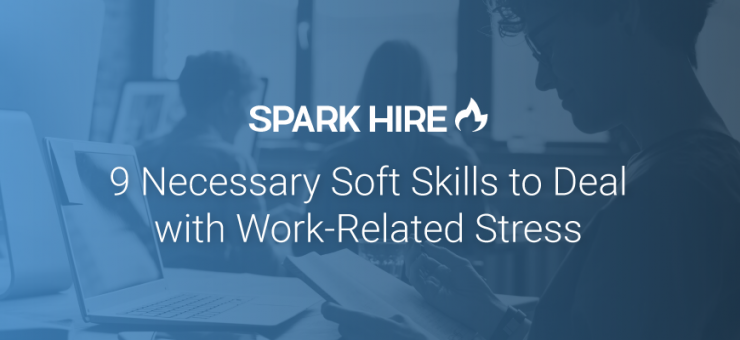Work-related stress is an increasing reality as employees have to overcome obstacles created by the shifting workforce. Because of the pandemic, more teams are now remote or hybrid. Most companies have adopted or are actively looking for new communication and collaboration tools. And HR teams have been forced to explore more advanced task and employee management resources to manage virtual teams.
Those who have returned to the office may continue to wear masks or work in more isolated conditions. Many of the group activities that used to make work easier or ease tensions are on hold. These circumstances can impact not only how a team works together, but also individual employee morale and productivity.
By now you’ve probably noticed certain employees have come out of the trials of the last year successfully hitting goals and keeping a clear head. These people share a number of common soft skills that make them resilient to work-related stress.
We turned to the experts to identify those skills so you can make hiring decisions that actively help your team become more adaptable and agile under stress. Here are nine soft skills that indicate your current and potential employees are well-equipped to handle work-related stress:
Diplomacy
Diplomatic ability is a skill that people might overlook when talking about stress management, but it is an essential one given the often overwhelming nature of remote work and juggling competing personal and professional demands.
This is because a lot of work-related stress comes down to having too much on your plate. Colleagues asking for help, people asking if you can cover for a co-worker who has to pick up kids from daycare, and so much more can quickly overwhelm you. Being able to tactfully but assertively say you are not able to comply will go a long way to keep potential stressors at bay.
I had a direct report recently tell me they were not going to be able to help me with extra work I was asking them to take on. But they committed to helping me with whatever I might need in the future. I was so impressed with how they handled the situation. I have used this approach in my own personal and work life since.
Markus Albert, Managing Director, EatFirst
 Having the ability to just say no goes a long way in alleviating work-related stress. This key soft skill may be more difficult to pick up on during the hiring process but can be assessed by asking a situational question like: “Your manager asks you to move up a deadline and take on an additional task to help the team hit a target. How do you handle the overwhelming demand?”
Having the ability to just say no goes a long way in alleviating work-related stress. This key soft skill may be more difficult to pick up on during the hiring process but can be assessed by asking a situational question like: “Your manager asks you to move up a deadline and take on an additional task to help the team hit a target. How do you handle the overwhelming demand?”

Self-care
Mental health is not just a pandemic hot topic or buzzword — it is something you should take seriously. How you feel about life and the world has a serious impact on your ability to handle stress. And people who are able to discuss and better understand their problems with professionals free up a lot of cognitive bandwidth for handling and managing other sources of stress in their life. People who are more self-caring look after their mental health.
Markus Albert, Managing Director, EatFirst
 It used to be considered a red flag when candidates or employees asked about time-off policies, but it could be an indication that talent practices good self-care. Be forthcoming about your company’s policies that encourage healthy work-life balance and share benefits that support mental wellness and reduce work-related stress.
It used to be considered a red flag when candidates or employees asked about time-off policies, but it could be an indication that talent practices good self-care. Be forthcoming about your company’s policies that encourage healthy work-life balance and share benefits that support mental wellness and reduce work-related stress.
Self-understanding
Self-understanding is important because it allows you to recognize your limits and request help from your co-workers when you are on the verge of succumbing to stress. Whenever I get the feeling that I would rather give up on something I’m doing or postpone it, regardless of the consequences because it is just too much to handle, I know it is time to ask a colleague to lend a hand.
Bryce Welker (CPA), CEO, CPA Exam Guy
Asking for help is not a sign of weakness but rather evidence one understands limits. This willingness to humbly request assistance makes it possible for your team to lean into each other and balance the workload. Self-understanding goes far in preventing burnout from work-related stress. You can discover this skill in talent by asking a behavioral question like: “Explain the steps you have taken when you reached your limit on a stressful project.”
 Self-discipline
Self-discipline
Self-discipline is a soft skill that is often overlooked but is certainly an essential skill that I consider with potential candidates when hiring. This trait is a great soft skill to develop because it isn’t held back by the confines of the right conditions or motivation to perform well. When an employee shows self-discipline, results happen; and this is something that is essential for the growth of any company, especially under stress.
Another great soft skill that I look for in applicants who show discipline is the willingness to be trained, regardless of their experience. This transfers over to being a great leader and is a trait that I hold in high regard because of the potential the employee has. Anyone who is willing and has the humility to be constantly curious and learning is as admirable as it is encouraging throughout a working culture.
Zach Reece, COO, Colony Roofers
 Self-discipline can present itself as a number of key soft skills you assess for in the hiring process, from a willingness to learn to time management to organizational skills and more. These skills help cut down on work-related stress!
Self-discipline can present itself as a number of key soft skills you assess for in the hiring process, from a willingness to learn to time management to organizational skills and more. These skills help cut down on work-related stress!
 A realistic outlook
A realistic outlook
According to my experience, people who have a realistic outlook are usually better at coping with stressful situations. They see things as they are, without manipulating anything in their heads. As a result, they often handle stress in a better manner.
Identifying a person with a realistic outlook within the short interview duration is not always easy. But, one thing which often helps me determine whether a person is a realistic thinker is assessing their planning skills. I usually ask candidates questions to get some insights about their participation in project planning activities with their previous team. The answers to these questions help me see if the candidate is actually a realistic thinker.
Jessica Robinson, Content Manager, The Speaking Polymath
 Even the best-laid plans can go awry, but unfortunately, what appears to be an ambitious plan can actually be a sign of a more chronic problem. Some people reach too far when trying to achieve work targets. And if they are not realistic, they could repeatedly miss deadlines by overthinking and over-complicating tasks. Be sure to assess critical thinking and planning skills to ensure employees are not going to burn out on the job.
Even the best-laid plans can go awry, but unfortunately, what appears to be an ambitious plan can actually be a sign of a more chronic problem. Some people reach too far when trying to achieve work targets. And if they are not realistic, they could repeatedly miss deadlines by overthinking and over-complicating tasks. Be sure to assess critical thinking and planning skills to ensure employees are not going to burn out on the job.
 Adaptability
Adaptability
This has been an essential soft skill at our all-remote digital media company this past year. Our company’s workload has grown, and there have been frequent changes in order to better serve our clients as well as trial-and-error process improvements. Team members who’ve excelled at being the most adaptable at accommodating all of these changes have risen to the top tier of our writing staff.
Adapting in the spirit of teamwork has been an essential soft skill throughout the pandemic, as team members have had to take time off to deal with the coronavirus, from contracting the virus themselves to caring for loved ones who contracted it and who, worst of all, passed away.
For each occurrence, our team expressed support and empathy for these individuals and rallied quickly with offers to take over the responsibilities of whatever work was needed to be done.
Karen Condor, HR Expert, USInsuranceAgents.com
 Adaptability is another key element of resilience when pressure heightens in the workplace. Coupled with great teamwork, the adaptability of your employees can lessen the burden of work-related stress across the entire team.
Adaptability is another key element of resilience when pressure heightens in the workplace. Coupled with great teamwork, the adaptability of your employees can lessen the burden of work-related stress across the entire team.
 A positive attitude
A positive attitude
A positive attitude, which includes friendliness, is a soft skill that I look for in potential hires as indicators that they will be able to handle workplace stress well.
Working from home due to lockdown restrictions made the double burden of having to juggle office work and house chores a reality for all in our company, and some of us just handled the stress better than others. For example, a veteran writer on my team who was tasked with training a new writer used this soft skill to encourage the newbie who was having productivity problems and was stressed out to the point of quitting.
Our veteran had great communication skills, including empathic listening, and was friendly. She was able to find out why our newbie was underperforming. She then offered some advice, which included research and writing techniques, that enabled our stressed newbie to better cope with stress and hit work targets. The fact that our veteran possessed the soft skills of knowing how to reach out, listen well, and show empathy, keeping with a positive attitude, helped reduce team member stress in our workplace.
Avner Brodsky, Co-founder and CEO, Superwatches.com
 A positive attitude can seem apparent right from the start of an interview or interaction, however, it’s important to see how people respond to stressful situations when making an impression is not front of mind. Challenge candidates to share how they maintain or project a positive outlook in the workplace with unique interview questions.
A positive attitude can seem apparent right from the start of an interview or interaction, however, it’s important to see how people respond to stressful situations when making an impression is not front of mind. Challenge candidates to share how they maintain or project a positive outlook in the workplace with unique interview questions.
 Empathy
Empathy
One of the most important soft skills that I look for in any employee is empathy. And while this is not often associated with being critical in the workplace, it is actually one of the most crucial skills that is necessary for both work and life. This is because it allows someone to be able to effectively read people and situations and adapt to them accordingly. This leads to better understanding within the workplace, promotes friendly cooperation, and encourages a trusting culture.
An important soft skill (that aligns with empathy) is emotional intelligence, and it’s one of the most important skills any team leader requires. This is essentially the ability to manage one’s personal emotions like stress and anxiety, especially when dealing with others.
A good case example of all these skills being put to use in my company is when an employee seemed out of focus during a recent online video conference call. One of the team leaders on the call took the time to contact them privately afterward and it turned out that they were starting to suffer from depression due to the excess isolation caused by lockdown measures. As a result, once I found out about the situation, the team leader suggested that they be given time off from work, which I rightfully agreed with.
Eden Cheng, Co-founder, WeInvoice
 Empathy and emotional intelligence are invaluable skills that contribute a great deal to resilience under stressful circumstances. While ideal to find innate in talent, these soft skills can be learned and refined. Fortunately, there is a simple test to assess for them.
Empathy and emotional intelligence are invaluable skills that contribute a great deal to resilience under stressful circumstances. While ideal to find innate in talent, these soft skills can be learned and refined. Fortunately, there is a simple test to assess for them.
 Boundaries
Boundaries
While we want dedication to our company’s mission and a commitment from new hires, it is actually more beneficial to hire someone with healthy boundaries around work-life balance. Workaholic employees can create unrealistic expectations based on past performance and will result in burnout long-term. Instead, have a conversation with new hires about how they want to balance work and other aspects of their lives.
Do they need to leave by a certain time for childcare purposes? Do they want a clear, structured amount of hours or do they prefer a more flexible schedule? You can help current employees by having this conversation and encouraging them to leave on time or give them the opportunity to be upfront about their workload. Since I have a remote team we are incredibly flexible, and I’ve grown accustomed to putting off non-urgent items until tomorrow so as not to stress anyone out.
Andrey Doichev, Founder, Inc and Go
 Setting and adhering to boundaries can be difficult for your HR team when there are so many different needs presented by employees. However, when a candidate or employee reveals they have created boundaries to maintain their mental wellness, they show a sense of awareness that can benefit the entire team in reducing work-related stress.
Setting and adhering to boundaries can be difficult for your HR team when there are so many different needs presented by employees. However, when a candidate or employee reveals they have created boundaries to maintain their mental wellness, they show a sense of awareness that can benefit the entire team in reducing work-related stress.













